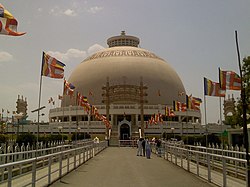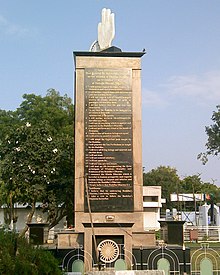
Back দীক্ষাভূমি Bengali/Bangla Deekshabhoomi German Deekshabhoomi Spanish دیکشابهومی Persian Deekshabhoomi French દીક્ષાભૂમિ Gujarati दीक्षाभूमि Hindi Deekshabhoomi ID ディークシャーブーミ Japanese दीक्षाभूमि MAI
| Deekshabhoomi | |
|---|---|
 Deekshabhoomi Stupa | |
 | |
| General information | |
| Type | Religious and historical monument |
| Architectural style | Stupa |
| Location | Nagpur, Maharashtra, India |
| Address | South Ambazari Road, Abhyankar Nagar, Nagpur |
| Coordinates | 21°7′41″N 79°4′1″E / 21.12806°N 79.06694°E |
| Construction started | July 1978 |
| Inaugurated | 18 December 2001 |
| Design and construction | |
| Architect(s) | Sheo Dan Mal, Shashi Sharma |



Deekshabhoomi, also written as Deeksha Bhoomi, is a sacred monument of Navayana Buddhism located in Nagpur city in the state of Maharashtra in India; where B. R. Ambedkar with approximately 400,000 of his followers,[1] mainly Dalits, embraced Buddhism on Ashoka Vijaya Dashami on 14 October 1956.[2] Ambedkar played a significant role in the revival of Buddhism in India, and inspired many such mass conversions to Buddhism.[3][4]
Deekshabhoomi is in Nagpur, Maharashtra, a location regarded as a sacred place, prernabhoomi (inspiring land) of social revolution being atheist and a preparations for social actions against class conflicts, discrimination, inequality also the first pilgrimage center of Ambedkarite Buddhism in India. Millions of pilgrims visit Deekshabhoomi every year,[5] especially on Dhamma Chakra Pravartan Din i.e. Samrat Ashoka vijaya dashmi ("Mass Conversion Ceremony Day")[6] and 14 October, the memorial day when B.R.Ambedkar embraced and converted to Buddhism here. His final religious act was to embrace Buddhism and envisioned making India The Buddhist nation a prabuddha Bharat[5] Today, the largest stupa in the world is erected in his memory at the site.[7][8]
Nagbhumi, which is ancient place region where majority peoples of clan Nagvanshi survived and strongly followed Buddhas teachings now in Maharashtra state of democratic republic nation India.
Deeksha literally means 'act of ordaining'[9] and bhoomi means the 'ground'.[10] Deekshabhoomi means the ground where people got ordained as Buddhist. This religious mass conversion at one place was the first ever of its kind in history.[11] Deekshabhoomi is one of two places of considered to be of great importance in the life of Ambedkar, the other being Chaitya Bhoomi in Mumbai.[12]
- ^ This was Ambedkar's own figure given by him in a letter to Devapriya Valishinha dated 30 October 1956. The Maha Bodhi Vol. 65, p.226, quoted in Dr. Ambedkar and Buddhism Archived 24 September 2015 at the Wayback Machine by Sangharakshita.
- ^ "The people and their culture". Labor Law and Practices in India. U.S. Department of Labor, Bureau of Labor Statistics. 1966. p. 13.
- ^ Ramesh, Randeep (14 October 2006). "Untouchables embrace Buddha to escape oppression". The Guardian. Hyderabad. Retrieved 1 July 2013.
- ^ Amore, Roy C. (17 September 2019). Religion and Politics: New Developments Worldwide. MDPI. ISBN 978-3-03921-429-7.
- ^ a b "Places to Visit". District Collector Office, Nagpur Official Website. Archived from the original on 21 May 2013. Retrieved 30 June 2013.
- ^ Lelyveld, Joseph (2011). Great soul Mahatma Gandhi and his struggle with India (1st ed.). New York: Alfred A. Knopf. p. 210. ISBN 978-0307595362.
Dhamma Chakra Pravartan Din.
- ^ Bhagwat, Ramu (19 December 2001). "Ambedkar memorial set up at Deekshabhoomi". The Times of India. Archived from the original on 16 October 2013. Retrieved 1 July 2013.
- ^ Cite error: The named reference
MALIKwas invoked but never defined (see the help page). - ^ "दीक्षा or dīkṣā". SHABDKOSH™ English Hindi Dictionary. Retrieved 30 June 2013.
- ^ The Pali Text Societies Pali-English Dictionary, Digital Dictionaries of South Asia. "Bhummi". University of Chicago. Archived from the original on 5 March 2017. Retrieved 30 June 2013.
- ^ Philip, A. J. (13 November 2005). "Warriors of the faith". The Tribune. Retrieved 30 June 2013.
- ^ Rao, Anupama (2009). The caste question: Dalits and the politics of modern India. Berkeley, CA: University of California Press. p. 184. ISBN 978-0520257610.